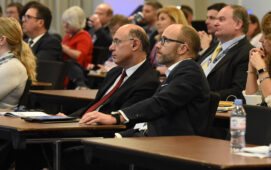
Three leading financial market infrastructures – DTCC, Clearstream, and Euroclear – in collaboration with Boston Consulting Group (BCG), have unveiled a blueprint aimed at establishing an industry-wide digital asset ecosystem to drive acceptance of tokenised assets.
The paper, “Building the Digital Asset Ecosystem,” highlights a significant $16 trillion business opportunity by 2030 through the tokenisation of global illiquid assets. It aims to overcome the current fragmented innovation landscape by defining six principles essential for the widespread adoption of tokenisation and digital asset securities, excluding cryptocurrencies. Additionally, it outlines comprehensive risk management controls crucial for the future of digital markets.
The partnership leverages the extensive experience and client networks of DTCC, Clearstream, and Euroclear, building on their previous efforts to foster global market participant collaboration. Last year’s whitepaper, “Advancing the Digital Asset Era, Together,” laid the groundwork for this latest initiative.
Renee Berman, Managing Director at DTCC Digital Assets, tells TradingTech Insight how the three organisations are committed to working together to lead the industry conversation and drive collaboration to advance the adoption of digital assets.
“Over the past 9 months, we have worked closely to produce two white papers to define our shared vision and galvanise the industry around The Digital Asset Security Control Principles (DASCP) framework, which we believe can serve as a baseline to foster discussions on standardisation and to encourage interoperability across platforms and systems,” she says. “In addition, all three institutions have pledged to leverage the DASCP in our own activities. We recognise that while each of our institutions has different priorities and that the market structure is unique across geographies, having three of the largest FMIs collaborate to help drive adoption of digital asset securities sends a powerful message to the market.”
The six principles proposed to guide the development of a unified digital asset marketplace include:
- Legal Certainty – Ensuring compliance with legal frameworks.
- Regulatory Compliance – Aligning operations with regulatory requirements.
- Resilience and Security – Developing robust infrastructure to protect against disruptions and secure sensitive data.
- Safeguarding Customer Assets – Implementing smart contract governance to manage assets securely.
- Connectivity and Interoperability – Enabling flexible settlements and transactions across diverse networks.
- Operational Scalability – Achieving efficiency and cost-effectiveness through standardisation.
“Similar to the Principles for Financial Market Infrastructures (PFMIs) established by BIS and IOSCO, these six principles serve as a guide to ensure that the emerging digital asset securities market is as safe and sound as the traditional securities market,” says Berman. “Recognising that there are multiple regulatory perspectives, we formulated the control principles to be adaptable and to serve as a broad framework for the industry. They are meant to function as guidelines that can be modified on an as-needed basis, given the regulatory environment governing each participant’s activities.”
Berman explains that Resilience and Security is a key principle to ensure the market for digital asset securities evolves to be as safe and secure as the traditional financial ecosystem. “We spent a significant amount of time with our risk teams to make this section of the paper comprehensive and to address all known cyber risks,” she says. “Through our analysis and conversations, we identified 16 unique risks associated with Resilience and Security, our largest set of risks. To offset these risks, we identified 14 specific controls focused on Resilience and Data Protection that can be deployed to mitigate these risks. While we believe our framework is very thorough, there may be novel risks that are identified as market practitioners deploy it. We anticipate the framework will evolve as new risks and controls are identified and put in place.”
In addition to the guiding principles, the new paper recommends risk mitigation controls to address issues such as asset mismanagement and governance of smart contracts. These include specifying access controls for smart contracts and maintaining detailed records of digital asset events and transactions.
“We are excited about the potential growth in the market, projected cost savings from enhancing operational efficiency and improved collateral management,” says Berman. “At DTCC, we have pledged to leverage the framework and apply it to our own digital asset activities. By doing this, we’ll effectively demonstrate to clients and regulators how DTCC is addressing the unique risks associated with digital asset securities, which will be critical in driving adoption. The rate of adoption of digital asset securities in the industry will be a key measure of success, but we recognise that a detailed risk and control framework is only one component to achieving this. For the digital asset ecosystem to mature, we still need a cash on-chain solution, interoperability between blockchain networks and with legacy infrastructure, technology and data standards and viable business cases to justify the investment.”
Subscribe to our newsletter


